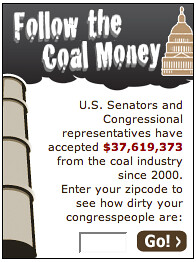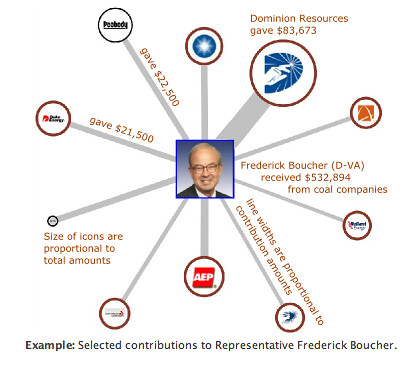
 We all know that coal poisons our planet, removes our mountains, and pollutes our precious water sources. A connection that we often miss, is how big coal and fossil fuel industries have a significant hand in dirtying up American politics.
We all know that coal poisons our planet, removes our mountains, and pollutes our precious water sources. A connection that we often miss, is how big coal and fossil fuel industries have a significant hand in dirtying up American politics.
Appalachian Voices and Oil Change International are proud to release a new interactive tool providing the first comprehensive look at the cash mined by Members of Congress from America's coal industry. Check out how much coal money is going to your member of congress at FollowtheCoalMoney.org
By searching for your Congressman, you can see a "relationship map." Unlike a physical map, where points are positioned at a geographic location, the icons for the companies and legislators are placed so that they are that they are as close as possible to whomever they contribute to or receive contributions from.
I am not sure I mind energy companies donating in PACs but the expectation of reciprocation should never be there. I believe in donating because you believe in the process or the candidate and not necessarily to promote an issue. Thoughts?
On Webb, I think that energy is one potential area where he could really make a huge difference in the Senate, but has chosen to stay mum. Check out this quote from his book on mountaintop removal/strip-mining.
The ever-hungry industrialists had discovered that...southwest Virginia sat atop one huge vein of coal. And so the rape began. The people from the outside showed up with complicated contracts that the small-scale cattle raisers and tobacco farmers could not fully understand, asking for 'rights' to mineral deposits they could not see, and soon they were treated to a sundering of their own earth as the mining companies ripped apart their way of life, so that after a time the only option was to go down into the hole and bring the Man his coal, or starve. The Man got his coal, and the profits it brought when he shipped it out. Oil made the Middle East rich. Coal made this part of Appalachia a poverty-stricken basket case while the rest of the mountain region remained mired in isolation.
So, revalations like yours are exactly why the FollowtheCoalMoney.org site can be useful in discerning motives.
Politicians favor the economic status quo of their districts because the known is easy. Challenging that, going with the unknown is difficult. Especially say supporting some alternative source, whose to say that economic activity will benefit SW Virginia or West Virginia? What replaces the economic activity that is lost and the tax revenue and jobs and people that go with it?
I'm not saying that I support this, but that I can understand the motivation.
The SCC, for instance, says that building a new coal-fired power plant in Wise County will actually cost the area jobs, just as mountaintop removal mining costs Virginia traditional coal-mining jobs.
Lifted from CleanEnergyVA:
While the coal plant would have 75 permanent employees,9 the hundreds of jobs Dominion promises would only be temporary construction jobs that would disappear once the plant is built. At the same time, the coal plant would accelerate mountaintop removal coal mining, a process that has done far more economic harm than good. Since 1980, Wise County has experienced a 28% decline in the average income and a 53.1% decline in mining jobs - despite an increase in coal production during the same timeframe.10
Mountain top removal coal mining also hurts the tourism industry in Wise County, which generates more than $32 million a year in expenditures, payroll, and state and local taxes. The Crooked Trail, Virginia's Heritage Music Trail, draws more than 60,000 visitors to Appalachia and Southwestern Virginia each year.11 The USA Today reports, "From Dickenson County to Galax, rural areas that offer winding trails, bluegrass music and wine tastings have become some of the state's fastest-growing attractions."12 And more than 35,000 acres of the pristine Jefferson National Forest lie within Wise County, providing a "multitude of outdoor recreational opportunities: hiking, biking, swimming, canoeing, hunting, fishing, camping, boating ...."13
So, the chicken or the egg? In this case, I think Boucher and Dominion (et. al) have built a lasting a trusting relationship that they both have each others' backs.
To respond to this:
Politicians favor the economic status quo of their districts because the known is easy. Challenging that, going with the unknown is difficult. Especially say supporting some alternative source, whose to say that economic activity will benefit SW Virginia or West Virginia? What replaces the economic activity that is lost and the tax revenue and jobs and people that go with it?
I'd personally recommend Virginia look to abolish the use of mountaintop removal mining and the burning of mountaintop removal coal for the damage MTR does to our economy through job-loss and destruction of valuable tourist areas. I'd also suggest that the state look to mandate investment in conservation and efficiency from the utilities. VA is near the very bottom in the nation in spending on C+E from our utilities. There are a million ways to decrease the energy we use from changing light bulbs to increasing the efficiency of the grid.
I'd also suggest that we tap into some of Appalachia's amazing wind potential. The workforce is well trained to transition from MTR/mining to industrial wind production, and we know we have the potential there.
Thoughts?
Dominion is also a big fish in a small pond. They are one of the largest utility companies in the country. It's difficult to contend with a Fortune 500 company headquartered in your state capital.
I think we will be more successful with a national RPS standard. And with a cap and trade system, coal is going to lose out to natural gas. No matter who is president next year, next year is going to be a giant leap forward in energy policy at the federal level; I'm sure of it.